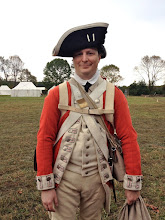by Stephen Brumwell (author of Redcoats and White Savage).
Published 2006 by McGill-Queen's University Press this new biography reassesses Wolfe's life and career and details his rise through the army. The author draws on many previously unpublished personal letters, exploring the attitudes of Wolfe and his allies and rivals during his career, as well as examining the process of his elevation to national hero after his death.
Brumwell mentions several of Wolfe's connections to 47th in the book including:
The song "Hot Stuff", composed by 47th grenadier Ned Botwood, is cited as an example of the high esprit de corps of Wolfe's army as it assembled for the assult on Quebec in 1759. The song mentions several incidents in the campaign up to that point, including the issue of uniforms meant for the 50th to members of the 47th, then known by its colonel's name "Lascelle's". The 50th had surrendered at Oswego and Botwood was anxious that the French would not mistake Lascelle's for Shirley's 50th. Hot Stuff is one of the few army songs that specifically mentions a British regiment. For more information on the song click here.
When the Forty-seventh Regiment is dashing ashore,
When bullets are whistling and cannon do roar,
Says Montcalm, "Those are Shirley's, I know their lapels."
"You lie," says Ned Botwood, "We are of Lascelles!
Though our clothing is changed, yet we scorn a powder-puff;
So at you, ye b-----s, here's give you Hot Stuff."
The 47th was in the first wave in the assult on Quebec along with the 28th, 43rd, 58th, Howe's Light Infantry, Fraser's Highlanders, and some grenadiers of the Royal Americans. After scaling the cliffs to the Plains of Abraham, the 47th was assigned a position in the line near the center. During the fighting they faced the compacted formations of the Bearn and Guyenne French regular regiments. The British adopted a two-rank line at open order, with about three feet between files, and 40-yard intervals between battalions. This was a formation they had practiced in preparation for the campaign and presages the more open, tactically independent British formations to come in the Revolution.

Colonel Hale of the 47th was assigned to carry the victory dispatches to the King. Hale afterward raised the 18th (soon after the 17th)Regiment of Light Dragoons, and he had a black line woven into the wool lace on their uniforms as a mark of mourning for General Wolfe. A similar line was added to the 47th's coat lace. Hale apparently also refused to pay the 100 pound fee to be included in Benjamin West's painting of Wolfe's death.
Perhaps most important for the soldiers who fought in the American Revolution, including the 47th, was Wolfe's influence on tactics and drill in the army. Brumwell discusses how Wolfe's aggressive tactics and simplified firing drill deeply influenced the next generation of military manuals including Bennet Cuthbertson and the 1764 Manual.
For more information on the book click here.







No comments:
Post a Comment